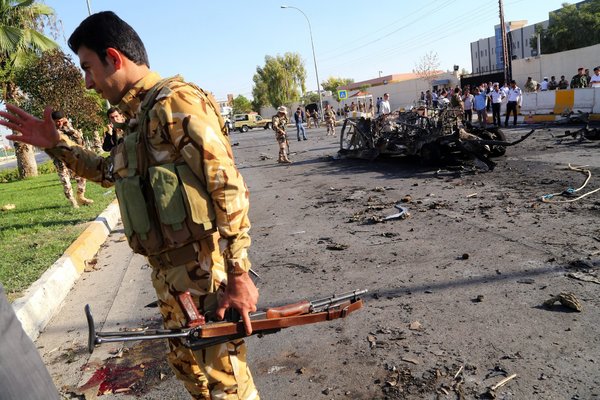Suicide Attack in Iraq's Kurdistan, Six Dead
Suicide attack in Erbil

NEW DELHI: A suicide attack killed at least six people, including the attacker, in Erbil, the capital of Iraq's autonomous Kurdish region. Several others were injured as the attacker tried to drive his vehicle into the governorate building on Wednesday.
No one immediately claimed responsibility for the attack, which is being reported in the media as an Islamic State (IS) operation as the militants -- who overran parts of northern Iraq this summer -- have repeatedly threatened to launch attacks against Kurdistan, thus far, unsuccessfully.
The United States, that is leading an international coalition against the IS, immediately condemned the attack. "The United States strongly condemns the continued terrorist attacks in Iraq, including the suicide car bomb attacks today in Basrah and the Iraqi Kurdistan Region in front of the Arbil Provincial Council Building that took a number of innocent lives," the US State Department said in a statement. "We extend our condolences to the families of the victims and hope for a rapid recovery for those who were injured," the statement continued, adding, “"The Iraqi people are determined to stand against the violence and horrific ideology of the Islamic State of Iraq and the Levant (ISIL).”
Whether the attack was carried out by IS or not, it is a worrying development given that Erbil has thus far been insulated from violence that has spread through Iraq. The last major attack in the city was over a year ago -- before the IS began its advance -- when fighters launched a coordinated suicide and car bomb attack on the headquarters of the security services. There was another attack in August, albeit with no casualties.
Meanwhile, the IS continues to make advances in Anbar province in Iraq -- kidnapping 40 truck drivers and businessmen along the highway connecting Anbar to Salahuddin in the north. The kidnapping follows the abduction of 50 people from an Iraqi Sunni tribe living east of the northern city of Tikrit.
A few weeks ago, the group was in the news for executing at least 322 members of the Al-Bu Nimr tribe, who had been resisting the militants in Anbar. The executions followed the public execution of at least 40 Sunni tribal fighters and security force personnel who had fought against the group in Hit.
Over the weekend, US-led coalition forces continued to strike IS targets in Iraq and Syria, carrying out a total of 31 airstrikes from November 14-17, US Central Command (CENTCOM) said in a statement.
In Syria -- where the strategically important border town of Kobani remains besieged, in addition to other strongholds -- US strikes focussed on the border town where, according to the statement, nine strikes destroyed seven IS fighting positions, suppressed another IS fighting position, destroyed four IS staging areas and struck one tactical IS unit. In Iraq, 20 airstrikes were carried out.
The US has been bombing Iraq and Syria since September 23, having previously outlined Kobani in Syria and Anbar in Iraq as key focus areas. Despite almost two months having passed since the US began its campaign against the IS in Iraq and Syria, the strikes have still not managed to root out the militants in either country, or province/city.



